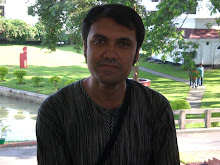 (I AM A WITNESS TO DAILY HAPPENINGS, DRAMAS, CHAOS...and a few POSITIVE CHANGES in Bangladesh)
(I AM A WITNESS TO DAILY HAPPENINGS, DRAMAS, CHAOS...and a few POSITIVE CHANGES in Bangladesh)
Date: Sun Jan 14, 2007
New Bangladeshi leader takes control of security agencies as mass arrests continue
Photo:AP
By JULHAS ALAM
Associated Press Writer
DHAKA, Bangladesh (AP) _ Bangladesh's new interim leader took charge of security agencies and the election commission Sunday, as mass arrests continued days after the president declared a state of emergency following weeks of deadly unrest ahead of disputed elections.
New leader Fakhruddin Ahmed also met with acting Chief Election Commissioner Mahfuzur Rahman to make fresh voting plans, as the impoverished country's two feuding political camps demanded that the ballot postponed from Jan. 22 be held as soon as possible.
"We have planned to sit with leaders of all political parties to discuss ways on how we can proceed further," the commission's secretary, Abdur Rashid Sarker, told reporters after the meeting.
Ahmed was appointed Friday after the president stepped down as leader of the caretaker government and declared a state of emergency to quell boycott threats, paralyzing strikes, and violent protests alleging the election was rigged.
More than 4,000 people were detained after the announcement, including 1,518 arrested overnight and Sunday, the Interior Ministry said, giving no further additional information.
The government said last week that disruptive elements would continue to be arrested until a new election was held.
Local news reports say people from both sides of the dispute over the elections have been detained.
The two feuding political camps on Sunday demanded the new caretaker government takes steps to announce a new election. It was their first clear response since President Iajuddin Ahmed ordered the state of emergency and appointed the new administration.
The major political alliance that organized the election protests, led by former Prime Minister Sheikh Hasina, on Sunday demanded new elections as soon as possible.
"We want the elections in a specific timeframe," alliance spokesman Abdul Jalil told reporters, without naming the timeframe.
He also demanded the new caretaker administration revamp the election commission, update and correct the voters' list and remove disputed election officials.
Separately, Hasina's rival former Prime Minister Khaleda Zia's four-party coalition also made a similar demand.
"We hope the new administration will take initiatives of holding a new election soon," Abdul Mannan Bhuiyan, Zia's close aide, told reporters late Sunday.
Ahmed, a respected economist and former central bank governor, took control of the Interior Ministry and Election Commission Secretariat on Sunday, a statement from the government's Cabinet Division said.
The new leader distributed portfolios to five newly appointed advisers Sunday at the new government's first meeting.
"We have discussed a range of issues including law and order, and the new elections," M.A. Matin, one of the five advisers, told reporters after the meeting. He did not elaborate.
One of the main challenges facing the new interim government was to ensure a credible election with the participation of all parties, the United News of Bangladesh news agency quoted another newly appointed adviser to the caretaker government as saying.
"We've two challenges before us right now _ collectively holding a free and fair election, and proper running of the ministries concerned," the agency quoted Mirza Azizul Islam as saying.
At least 34 people have been killed in the protests that began in late October, when Zia ended her five-year term and handed over power to an interim government led by the president.
The alliance led by Hasina had threatened to boycott and disrupt the polls unless their demands for election reforms were met.
The president declared a state of emergency on Thursday, deferred the elections, and stepped aside as head of the caretaker government. A day later, he swore in Fakhruddin Ahmed, but retained the mostly ceremonial post of president .
Under the constitution, the president is in normally in charge of the Ministry of Defense, but the current troops' movement is being regulated under the Election Commission, now controlled by the interim leader Ahmed.
Police and other security agencies including a paramilitary force operate under the Interior Ministry, now also controlled by the interim leader.
The new interim government was welcomed by the business community, which had been fed up with disrupted commerce and transportation during the recent political protests.
"We hope that under the leadership of the new caretaker administration, dynamism will return to the export business and the country's image will be restored," Fazlul Huq, president of the Bangladesh Knitwear Manufacturers and Exporters Association, said in a news release.
In a separate statement, Bangladesh Textile Mills Association leader Abdul Hai Sarker said he hoped that "the steps taken by the president were timely and bold enough to ease the volatile political situation and improve the overall trade and commercial situation."





